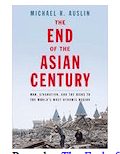When HMS Queen Elizabeth makes her maiden voyage in 2021 as the United Kingdom’s newest aircraft carrier, its White Ensign will flutter far from traditional Royal Navy haunts in the Atlantic and Mediterranean. According to Sir Kim Darroch, HM Ambassador in Washington, DC, Britain’s largest and most visible warship will sail Pacific waters, with fifth-generation F-35 fighters and drones embarked, purposely to send a message that the United Kingdom will “protect freedom of navigation and to keep sea routes and air routes open.”
While such an assertion regarding the waters surrounding the British Isles, continental Europe, or even the Middle East would raise no eyebrows, inserting the Royal Navy into one of the world’s tensest territorial disputes is no small matter. Darroch’s statement about freedom of maritime and aerial navigation can only be interpreted as a warning shot across the bow of China, whose expansive claims in the South China Sea and belligerent actions have caused the U.S. Navy’s top commander in the Pacific, Admiral Harry Harris, to reiterate that he is ready to confront Beijing, if necessary.
For many nations in Asia, the sight of the Queen Elizabeth will be a welcome one, the more so if she indeed sails into the disputed waters around the Spratley and Paracel Islands. There should be no doubt, however, that doing so entails the risk of worsening relations with China in an area that it considers part of its own territory and a vital national interest.
Here, where China has reclaimed islands from reefs and shoals, turning them into militarized bases, smaller nations who claim the same waters have increasingly felt overmatched. Even the ruling last summer from The Hague’s Permanent Court of Arbitration, rejecting all of China’s claims to the South China Sea, did little to stop Beijing’s militarization campaign.
With Donald Trump coming to the presidency, no one is sure how either side will act. Trump’s pre-inauguration phone call with Taiwan’s president, Tsai Ing-wen, sent a clear message of its own that the new president will not automatically adhere to the carefully ambiguous triangular diplomacy among Washington, Beijing, and Taiwan. Trump’s subsequent statements, linking together security issues with economic cooperation, set the stage for a more pronounced reorientation of U.S. strategy towards China. In what many considered a direct warning to Trump, the brazen, if temporary seizure of a U.S. Navy underwater drone in December showed that the Chinese navy is willing to challenge America on the high seas.
But it is precisely the uncertainty and spectre of growing instability in Asia that makes the Queen Elizabeth’s intended voyage that much more important. Since World War II, the goal of U.S. security policy in both Asia and Europe has been to prevent the emergence of a regional hegemon who could intimidate or dominate the states around it. Today the fear is that China is rapidly approaching such a capability, despite its internal troubles and weakening economy. President Obama’s ambiguous response to Chinese advances in the South China Sea, however, has hamstrung efforts to find willing partners working to ensure freedom of navigation. Indeed, China has successfully wooed the new Philippines’ president and sidelined Australia, traditionally one of America’s closest allies.
The Trump Administration should welcome the fact that, as Sir Michael Fallon put it, “in a dangerous world, Britain is stepping up.” No doubt the public announcement was meant as much to signal that a post-Brexit Great Britain will try to remain a global player, as it was to let the incoming Trump Administration know that London will remain an indispensable partner. No one expects the Royal Navy to once again be the mistress of the seas, but with a shrinking U.S. Navy, occasionally having an extra allied ship, especially a big one like an aircraft carrier, in tense Asian waters is no bad thing.
The downside, of course, is that the Prime Minister could experience the same kind of pressure that Beijing applied to the Hinckley Point nuclear power plant decision. Indeed, the pressure may be intensified, as Britain will be playing in China’s backyard. The Chinese strategy has been to prevent the formation of any type of functional alliance in opposition to its maritime claims, and to isolate the various actors through economic threats or blandishment, and sometimes bald machtpolitik rhetoric.
None of that should dissuade London from carrying through on its plan, however. It would be better, of course, were the Queen Elizabeth ready to sail today. A great deal will happen between now and 2021, and it is impossible to predict what the security environment will look like when the Royal Navy shows up in Asia’s seas.
Yet, even making clear that Great Britain feels a responsibility to help ensure stability in waters far from its home islands may encourage others to play a larger role, and to send another, and needed message to Beijing that its interests are better served through cooperation than confrontation.
Michael Auslin will be speaking at Policy Exchange’s The End of the Asian Century? East-West Relations in the Age of Trump event on 19 January

